2007年VOA标准英语-Turkey Holds Crucial Election Sunday
搜索关注在线英语听力室公众号:tingroom,领取免费英语资料大礼包。
(单词翻译)
By Sonja PaceIstanbul
19 July 2007
Voters in Turkey go to the polls Sunday to elect a new parliament, which in turn will form the new government. More than a dozen political parties and a slate1 of independent candidates are vying2 for the 550 seats, but as VOA's Sonja Pace reports from Istanbul, there is a widespread belief that the country's future direction is at stake.
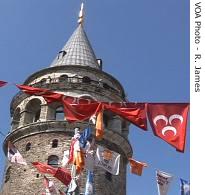
Historic Galata Tower with flags of political parties, in Istanbul, 19 Jul 2007
It is election time in Turkey and voters are ready to have their say.
The ruling Justice and Development Party, the AKP, is out in force. Its banners are hard to miss and its leader, Prime Minister Recep Tayyip Erdogan, makes his pitch to voters.
The party takes credit for a burgeoning3 economy, growing foreign investment and for launching talks to join the European Union.
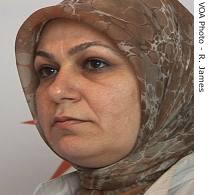 |
| Sheyma Dueje |
She also dismisses opposition6 claims that the AKP wants to impose an Islamic state or force women to cover their hair. She says the party judges no one by what they wear or how they look.
Critics do not agree, and the main opposition faction7, the Republican Peoples' Party, the CHP, is leading the charge.
The opposition cites the AKP's Islamist roots - the fact that its main leaders are openly devout8 Muslims whose wives wear the traditional Islamic headscarf.
And, they dismiss arguments from AKP leaders that being a devout Muslim does not conflict with upholding the constitution or presiding over a democratic state.
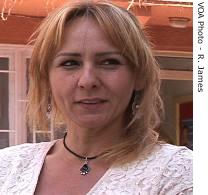 |
| Oya Tuemer |
"They have a secret agenda that they do not want to tell us," said Tuemer. "This is that they want Islam to rule this country."
Tuemer insists the AKP wants to take Turkey backwards9, to the days of the Ottoman Empire that long held sway over this region. The CHP, on the other hand, sees itself as the guardian10 of secularism11, as espoused12 by Mustafa Kemal Ataturk, the founder13 of modern Turkey.
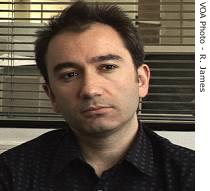 |
| Mustafa Akyol |
"This election in Turkey will be kind of a referendum on the current government - the current government led by the Justice and Development Party [AKP], which defines itself as conservative, but some secularists see as Islamist," said Akyol.
The vote is seen as equally crucial for the secularist15 agenda, as political science professor Ali Carkoglu of Sabanci University, outside Istanbul, explains.
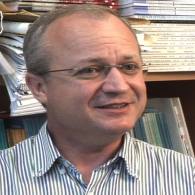 |
| Ali Carkoglu |
Carkoglu believes these secularist fears are overblown.
Despite such deep ideological16 divides, opinion polls show most Turks rate problems of daily life highest on their list of concerns, problems of unemployment and the ongoing17 battle against Kurdish separatist.
The AKP is expected to win the most votes in Sunday's elections. The CHP is said likely to come in second and at least one other party is given a chance of passing the 10 percent vote threshold to make it into parliament. And, polls show 30 to 40 independent candidates also have a good chance of gaining a seat.
 收听单词发音
收听单词发音 




